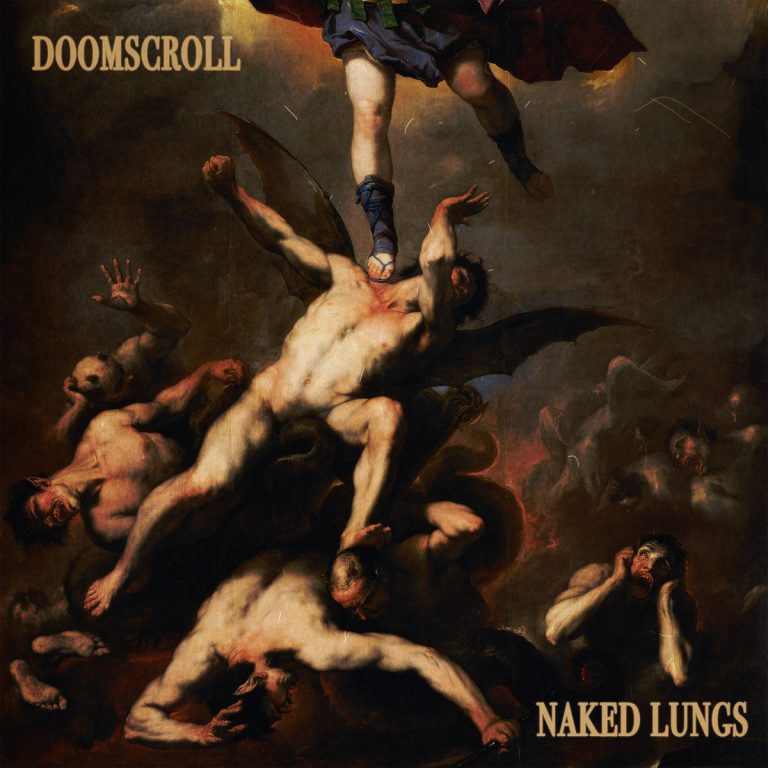While Greco-Christian narratives lean toward an externalization of good and evil, modern psychology emphasizes that, as Joseph Campbell wrote, “heaven and hell are within us”. The conjoined metaphors of God and Satan point to parts of the unconscious that manifest in cognitive dissonance and myriad neuroses, lest the clashing energies are workably reconciled, in which case creativity, innovation, and/or wisdom emerge. With their debut, Doomscroll, Dublin-based quartet Naked Lungs capture what it’s like to live in uncertainty, to be battered by ambition, desire, and the concurrent hope for release: to contend with a self that is both hardwired and the product of intergenerational conditioning.
Ably produced by Gilla Band’s Daniel Fox, Doomscroll launches with “Gack”, a stunning synthesis of lo-fi and highbrow aesthetics. Nightmarish blares, clamors, and semi-riffs complement singer Tom Brady as he addresses the apparent dispensability of a single life: “We race for moments lost to the gutter / erased but kindly replaced for another”. Indeed, a society can’t flourish when it runs almost entirely on the fuels of greed and competition, devaluing an individual’s existence, reducing it to statistics, likes/dislikes, and dollar signs. Is it any surprise that we grope for status, validation, positive reflections? – each of us a Narcissus staring into murky water, desperate to see the face of our dreams. As the track concludes, the band navigate a swath of noise and clangorous accents, Brady repeating and repeating the word “ominous”.
“Second Song” moves from rough-edged and apocalyptic-sounding segments to more spacious sprawls. “What do you want? / what do you need?” Brady asks, desire no more than a neurological twitch triggered by an advertisement, a goal simply a function that’s been coded into your psyche by family, school and religion. “River” is a serrated manifesto, Brady ranting, “This is my pity / … it burns it boils within me”. The band dive into a trebly drone while Brady embodies a punkish blend of cynicism, self-loathing, and misanthropy.
“Isolated living on this overcrowded train ride / the journeys never finished, relentless is the pain / that broke my brain and turned me into rubbish”, Brady reflects on “Relentless”, equating contemporary life with claustrophobia, Sisyphean labors, and disempowerment (his timbre and cadence, meanwhile, reminiscent of Black Country, New Road’s ex-singer Isaac Wood). The band practice restraint and explosiveness, illustrating the way in which we oscillate between withdrawal or self-suppression and aggression, unable to find middle ground. As the song unfolds, the band follow Brady’s lead, accenting his vocal with metallic eruptions, then vacating the space like a crowd fleeing a bomb site, Brady left to writhe in his despair. Finally, the band adopt an unbridled maximalism while Brady strives to make peace with his alternating rage and anhedonia (which he effectively and appropriately fails to do).
Model/Actriz will strike some listeners as Naked Lungs’ clear counterpart, at least in terms of sonics. The Brooklyn band’s debut album Dogsbody makes use of similarly brash instrumentation, including reconfigurations of postpunk structures and industrial-inflected textures. Both bands craft a post-humanistic soundtrack over which their singers express their tsunamic angst. The two singers’ vocal stylings, too, have much in common, though their motivations differ. While Model/Actriz’s Cole Haden is preoccupied with sexuality – its sacredness and depravity – Brady is more concerned with therapeutic inquiry, including an examination of his MO as a male in a lingeringly patriarchal world. Additionally, Haden is intrigued by the value of persona – à la Bowie, Prince, Lana Del Rey – how persona, rather than being an impediment, can serve as a vehicle by which to make valuable discoveries. Brady, on the other hand, yearns to transcend persona, which he associates with the ego, though he implicitly concludes that such freedom, while perhaps accessible, is ultimately unsustainable.
As Doomscroll progresses, the band continue to display their gift for sonic precisions. “Pressure” brings to mind Gilla Band’s latest outing, Most Normal, vacillating between guitarist Andrew Connaughton’s heavily distorted/staccato chords and more mercurially ambient segments. Brady’s voice and the band’s fierce sonic assault evoke the psychic overload which seems pervasive these days, resulting in elevated cases of depression and suicide. “Database” revolves around a distorted riff and Matt Pyper’s hammering drum part, occurring as a cross between early Strokes and Primus, Brady moving between a spoken-word style and agitated singing that recall Valentine Caulfield’s adrenalized sprechgesang. On “Boo Boo”, one is tempted to laugh when Brady offers, “I’m not having a good time”. Soon enough, however, the urge to chuckle evaporates as he declares, “I’ve made a comic of myself”. Clearly his notion of a comic is more akin to Joaquin Phoenix’s portrayal of Arthur Fleck than anyone you’d see/hear in a mainstream stand-up club.
George Harrison’s “I Me Mine” is a post-psychedelic, anti-capitalist anthem. By today’s standards, however, it can sound condescending, a multimillionaire preaching to us about our grubby egos (though listening to it again, it actually sounds fairly self-directed). The songs on Doomscroll, at any rate, embrace a more twisted Everyman vibe. If Harrison lamented from a mountaintop (or at least from behind a security gate), Brady gnashes his teeth from inside a cage that looks remarkably like our own cages. Perhaps he’s aware that the matrix isn’t real, though he hasn’t figured out how to fully extricate himself from it either. If the 21st century has taught us anything, it’s that empathy is the great bridge builder. Naked Lungs know what it’s like to be a reluctant servant to the self, what it’s like to wish for liberation that remains out of reach. They’re modern-day romantics; we can trust them, even if we, like them, can’t trust ourselves.


